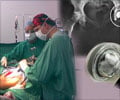Discovery may explain why more females than males get knee osteoarthritis and new research could lead to blood test, preventive strategies, and drug treatments.

‘As a more common problem in women than men, hormones alone are not enough to explain the difference.’





The researchers have conducted the experiments in part by simulating minimal gravity levels in space, which reflects the damage that could happen to meniscus due to lack of exercise and the findings were elaborated in the journal Frontiers in Bioengineering and Biotechnology.Female or women astronauts can avoid knee injuries during space flight — and better tests, prevention, and treatment for knee osteoarthritis for women on Earth — based on newly published research on gender differences in knee meniscus tissues.
“Some of the genes that were found in the females that responded more to simulated space microgravity were also associated with the development of knee osteoarthritis,” said Principal Investigator Adetola Adesida, professor of surgery in the Faculty of Medicine & Dentistry.
Research suggests the possibility of a blood test to find out who has the high-risk gene, allowing for early interventions such as physiotherapy, and eventually drug therapy and treatment. This will allow women to stay in space longer.
“We’ve uncovered the mechanisms that lead to this higher response, and we are hoping to develop drugs to target those pathways and block those responses,” Adesida said.
Advertisement
Adesida and his team have developed bioengineered meniscus tissue grown from cells removed from the damaged meniscus of healthy individuals. It can be hoped that one day we may be able to replace the damaged tissue with a transplant, avoiding the osteoarthritis.
Advertisement
“Our loading and unloading experiment mimics what we actually see in a clinical situation where the development of spaceflight microgravity-induced knee osteoarthritic changes is possible,” he said.
“This will help us to have human relevant models to study knee osteoarthritis in the future. And our research has both Earth benefits and space benefits.”
Source-Medindia











